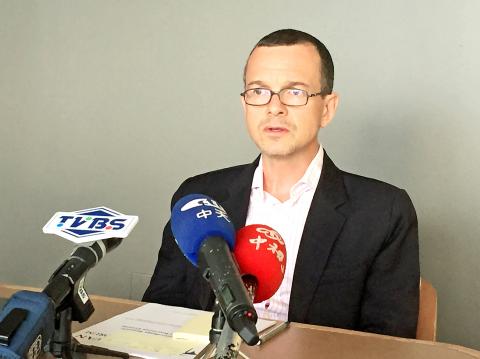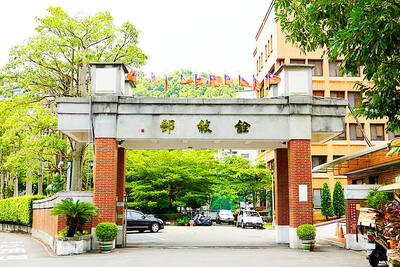A new arms package for Taiwan is making its way through the complex channels of the US political system, US-Taiwan Business Council president Rupert Hammond-Chambers said on Wednesday.
It follows an unprecedented period of no new US arms sales to Taipei.
“I would characterize the programs that are being looked at now — and these have all popped up in the last year or so — as house cleaning,” Hammond-Chambers said.

Photo: CNA
However, the new package is to consist of nothing much more than second-hand equipment, upgraded equipment and munitions.
Such a sale is unlikely to come before the fourth quarter of next year.
“Any new capabilities under consideration for Taiwan will be left almost certainly to the next US administration,” Hammond-Chambers said.
He was speaking at a Washington press conference following the release of a new report by the US-Taiwan Business Forum.
Hammond-Chambers said that by the end of next year, up to 24 of Taiwan’s frontline F-16 jets would be taken out of service for upgrades.
“In my view, this will exacerbate the debate over what to do about the future of Taiwan’s air force and put further strain on it,” he said.
The natural conclusion to Taiwan not receiving new fighters is that Taiwan would not have an air force, Hammond-Chambers said.
“At some point, the fighters have to be replaced and that should be an ongoing process,” he said.
He said that the likely next platform for Taiwan should be an upgraded fourth-generation F-16.
He said submarines and fighters are “incredibly expensive,” but Taiwan needs an undersea force and a robust modern fighter force to provide security, and the money is going to have to come from somewhere.
Hammond-Chambers said a limited purchase of F-16C/Ds — not the 66 originally wanted, but a more modest group of between 24 and 33 — might be considered by the next president of Taiwan and the next US president.
“That issue of the fighter replacement is going to be very much about who wins the presidential election here in the US,” he said.
Any such sale would likely come in the first year of a new administration, because after that it becomes more difficult politically, he said.
“History suggests that a Republican administration would be more likely to sell arms to Taiwan, but if [former US secretary of state] Hillary [Rodham] Clinton were to win the Democratic Party nomination and be elected, her national security team would have some strong voices for Taiwan,” Hammond-Chambers said.
“I would say to the Taiwan people that national security is expensive, modern weapons are expensive. Taiwan can develop some of them domestically, but some capabilities they will have to procure,” he said.
Hammond-Chambers said that returning to a period where the US sells arms to Taiwan on a regular basis would be “very difficult,” given the long freeze.

Taiwan Semiconductor Manufacturing Co (TSMC, 台積電) is expected to start construction of its 1.4-nanometer chip manufacturing facilities at the Central Taiwan Science Park (CTSP, 中部科學園區) as early as October, the Chinese-language Liberty Times (the Taipei Times’ sister newspaper) reported yesterday, citing the park administration. TSMC acquired land for the second phase of the park’s expansion in Taichung in June. Large cement, construction and facility engineering companies in central Taiwan have reportedly been receiving bids for TSMC-related projects, the report said. Supply-chain firms estimated that the business opportunities for engineering, equipment and materials supply, and back-end packaging and testing could reach as high as

CHAMPIONS: President Lai congratulated the players’ outstanding performance, cheering them for marking a new milestone in the nation’s baseball history Taiwan on Sunday won their first Little League Baseball World Series (LLBWS) title in 29 years, as Taipei’s Dong Yuan Elementary School defeated a team from Las Vegas 7-0 in the championship game in South Williamsport, Pennsylvania. It was Taiwan’s first championship in the annual tournament since 1996, ending a nearly three-decade drought. “It has been a very long time ... and we finally made it,” Taiwan manager Lai Min-nan (賴敏男) said after the game. Lai said he last managed a Dong Yuan team in at the South Williamsport in 2015, when they were eliminated after four games. “There is

Democratic nations should refrain from attending China’s upcoming large-scale military parade, which Beijing could use to sow discord among democracies, Mainland Affairs Council Deputy Minister Shen You-chung (沈有忠) said. China is scheduled to stage the parade on Wednesday next week to mark the 80th anniversary of Japan’s surrender in World War II. The event is expected to mobilize tens of thousands of participants and prominently showcase China’s military hardware. Speaking at a symposium in Taichung on Thursday, Shen said that Chinese Minister of Foreign Affairs Wang Yi (王毅) recently met with Indian Prime Minister Narendra Modi during a visit to New Delhi.

FINANCES: The KMT plan to halt pension cuts could bankrupt the pension fund years earlier, undermining intergenerational fairness, a Ministry of Civil Service report said The Chinese Nationalist Party (KMT) caucus’ proposal to amend the law to halt pension cuts for civil servants, teachers and military personnel could accelerate the depletion of the Public Service Pension Fund by four to five years, a Ministry of Civil Service report said. Legislative Speaker Han Kuo-yu (韓國瑜) on Aug. 14 said that the Act Governing Civil Servants’ Retirement, Discharge and Pensions (公務人員退休資遣撫卹法) should be amended, adding that changes could begin as soon as after Saturday’s recall and referendum. In a written report to the Legislative Yuan, the ministry said that the fund already faces a severe imbalance between revenue